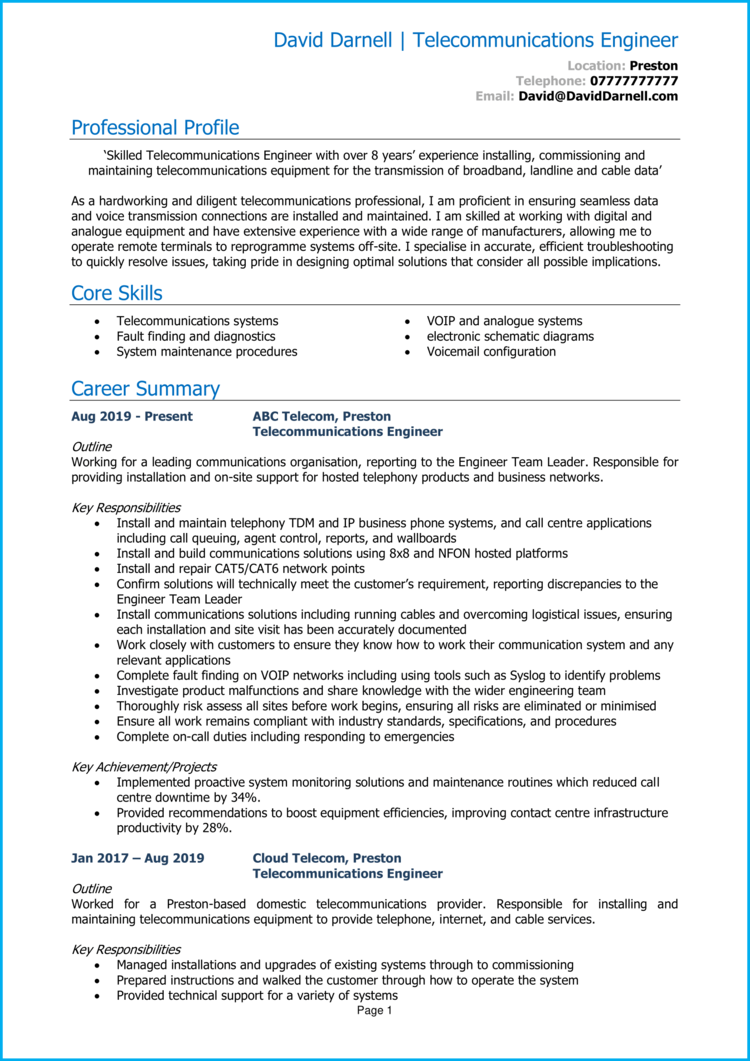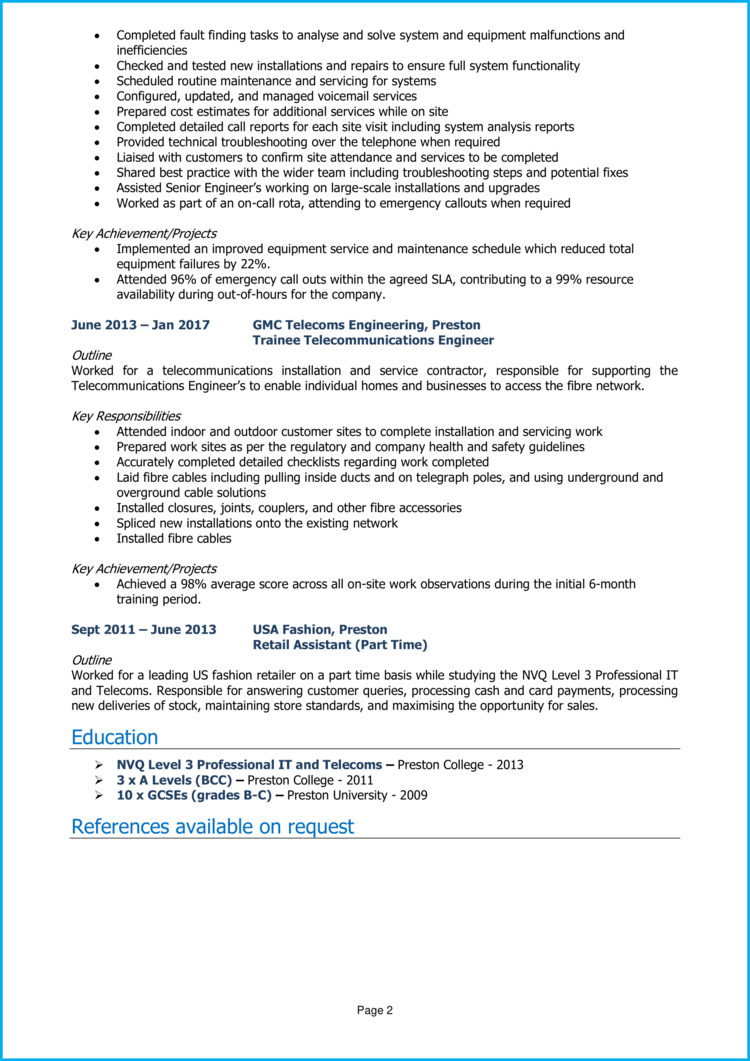Not only is a role as a telecommunications engineer very interesting and varied, but these positions also come with a great salary.
The only catch is that this is a competitive industry; therefore, you need to do all you can to showcase your technical skills in your CV and stand out from other candidates.
To help you do this, we’ve put together an example telecom engineer CV, as well as some of our top tips for crafting a strong application.
|
Telecom Engineer CV example
This example CV demonstrates how to effectively structure and format your own Telecom Engineer CV, so that it can be easily digested by busy employers, and quickly prove why you are the best candidate for the jobs you are applying to.
It also gives you a good idea of the type of skills, experience and qualifications that you need to be including and highlighting.
Telecom Engineer CV structure and format
Your CV is the very first impression you’ll make on a potential employer.
A disorganised, cluttered and barely readable CV could seriously decrease your chances of landing interviews, so it’s essential to make sure yours is slick, professional and easy to navigate.
You can do this by employing a clear structure and formatting your content with some savvy formatting techniques – check them out below:
Formatting Tips
- Length: While there’s no ‘official’ CV length rule, the majority of recruiters agree that less is more. Aim for two pages of A4 or less. This is just enough room to showcase your suitability to the role, without overwhelming recruiters with irrelevant or excessive content.
- Readability: Help out time-strapped recruiters by formatting your CV for easy reading. Using lots of bullet points and lists will help them to skim through your info, while clearly formatted headings will allow them to navigate towards the content which is most useful to them.
- Design: Your CV needs to look professional, sleek and easy to read. A subtle colour palette, clear font and simple design are generally best for this, as fancy designs are often harder to navigate.
- Avoid photos: It’s tempting to add a profile photo or images to your CV, especially if you’re struggling to fill up the page – but it’s best avoided! They won’t add any value to your application and, as are not a requirement the UK, so recruiters do not expect it, or want to see it.


Structuring your CV
As you write your CV, work to the simple but effective structure below:
- Name and contact details – Pop them at the top of your CV, so it’s easy for recruiters to contact you.
- CV profile – Write a snappy overview of what makes you a good fit for the role; discussing your key experience, skills and accomplishments.
- Core skills section – Add a short but snappy list of your relevant skills and knowledge.
- Work experience – A list of your relevant work experience, starting with your current role.
- Education – A summary of your relevant qualifications and professional/vocational training.
- Hobbies and interests – An optional sections, which you could use to write a short description of any relevant hobbies or interests.
Now I’ll guide you through exactly what you should include in each CV section.
CV Contact Details
Start off your CV with a basic list of your contact details.
Here’s what you should include:
- Mobile number
- Email address – It’s often helpful to make a new email address, specifically for your job applications.
- Location – Share your town or city; there’s no need for a full address.
- LinkedIn profile or portfolio URL – Make sure the information on them is coherent with your CV, and that they’re up-to-date
Quick tip: Delete excessive details, such as your date of birth or marital status. Recruiters don’t need to know this much about you, so it’s best to save the space for your other CV sections.
Telecom Engineer CV Profile
Your CV profile is basically a short introductory paragraph, which summarises your key selling points and highlights why you’d make a good hire.
So, write a well-rounded summary of what you do, what your key skills are, and what relevant experience you have.
It needs to be short, snappy and punchy and, ultimately, entice the reader to read the rest of your CV.
Tips for creating an impactful CV profile:
- Keep it brief: It might be tempting to submit a page-long CV profile, but recruiters won’t have the time to read it. To ensure every word gets read, it’s best to include high-level information only; sticking to a length of 3-5 lines.
- Tailor it: Recruiters can spot a generic, mass-produced CV at a glance – and they certainly won’t be impressed! Before you write your profile (and CV as a whole), read through the job advert and make a list of any skills, knowledge and experience required. You should then incorporate your findings throughout your profile and the rest of your CV.
- Don’t add an objective: Want to talk about your career goals and objectives? While the profile may seem like a good space to do so, they’re actually much better suited to your cover letter.
- Avoid cliches: Cheesy clichès and generic phrases won’t impress recruiters, who read the same statements several times per day. Impress them with your skill-set, experience and accomplishments instead!
What to include in your Telecom Engineer CV profile?
- Summary of experience: To give employers an idea of your capabilities, show them your track record by giving an overview of the types of companies you have worked for in the past and the roles you have carried out for previous employers – but keep it high level and save the details for your experience section.
- Relevant skills: Make your most relevant Telecom Engineer key skills clear in your profile. These should be tailored to the specific role you’re applying for – so make sure to check the job description first, and aim to match their requirements as closely as you can.
- Essential qualifications: If the jobs you are applying to require candidates to have certain qualifications, then you must add them in your profile to ensure they are seen by hiring managers.
Quick tip: Your CV is your first impression on recruiters, so it’s vital to avoid spelling and grammar mistakes if you want to appear professional. Use our quick-and-easy CV Builder to add pre-written content that has been crafted by recruitment experts.
Core skills section
In addition to your CV profile, your core skills section provides an easily digestible snapshot of your skills – perfect for grabbing the attention of busy hiring managers.
As Telecom Engineer jobs might receive a huge pile of applications, this is a great way to stand out and show off your suitability for the role.
It should be made up of 2-3 columns of bullet points and be made up of skills that are highly relevant to the jobs you are targeting.


Work experience/Career history
Now it’s time to get stuck into your work experience, which should make up the bulk of your CV.
Begin with your current (or most recent) job, and work your way backwards.
If you’ve got too much experience to fit onto two pages, prioritise space for your most recent and relevant roles.
Structuring your roles
Your work experience section will be long, so it’s important to structure it in a way which helps recruiters to quickly and easily find the information they need.
Use the 3-step structure, shown in the below example, below to achieve this.
Outline
Start with a brief summary of your role as a whole, as well as the type of company you worked for.
Key responsibilities
Next up, you should write a short list of your day-to-day duties within the job.
Recruiters are most interested in your sector-specific skills and knowledge, so highlight these wherever possible.
Key achievements
Round up each role by listing 1-3 key achievements, accomplishments or results.
Wherever possible, quantify them using hard facts and figures, as this really helps to prove your value.
Education
After your work experience, your education section should provide a detailed view of your academic background.
Begin with those most relevant to Telecom Engineer jobs, such as vocational training or degrees.
If you have space, you can also mention your academic qualifications, such as A-Levels and GCSEs.
Focus on the qualifications that are most relevant to the jobs you are applying for.
Interests and hobbies
The hobbies and interests CV section isn’t mandatory, so don’t worry if you’re out of room by this point.
However, if you have an interesting hobby, or an interest that could make you seem more suitable for the role, then certainly think about adding.
Be careful what you include though… Only consider hobbies that exhibit skills that are required for roles as a Telecom Engineer, or transferable workplace skills.
There is never any need to tell employers that you like to watch TV and eat out.


Essential skills for your Telecom Engineer CV
Tailoring your CV to the roles you are applying for is key to success, so make sure to read through the job descriptions and tailor your skills accordingly.
However, commonly desired Telecom Engineer skills include:
Telecommunications knowledge: One of the most important skills you’ll need is knowledge of the telecommunications and broadcasting industry
IT/technical skills: You must also be able to competently use a computer and the main engineering software and operating systems
Installation: You will find yourself working with aerial rigging and related equipment; therefore, you need to be able to install mobile and static antennae when required
Analysis and diagnosis: As a telecoms engineer, you’ll be expected to diagnose and then fix any faults in the systems you’re working on
Attention to detail: Because this is such a technical role, attention to detail is a must to ensure you don’t make any errors and that you’re able to spot any potential issues
Writing your Telecom Engineer CV
Creating a strong Telecom Engineer CV requires a blend of punchy content, considered structure and format, and heavy tailoring.
By creating a punchy profile and core skills list, you’ll be able to hook recruiter’s attention and ensure your CV gets read.
Remember that research and relevance is the key to a good CV, so research your target roles before you start writing and pack your CV with relevant skills.
Best of luck with your next application!










